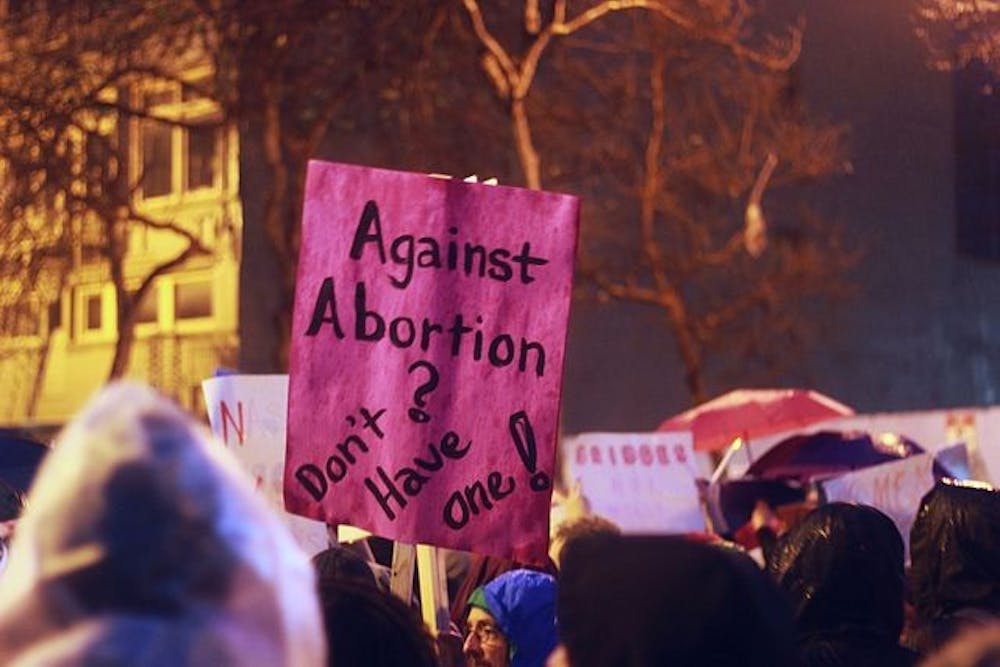In the months since the Supreme Court’s decision to overturn Roe v. Wade, many in the University community have felt helpless about the future of reproductive rights. Light has since been shed on the highly intersectional nature the effects of the ruling will have. Discussions surrounding the negative impacts of the ruling have been ongoing after the ruling. Banning abortions does not stop all abortions — it just stops safe ones. This means the ruling will compel individuals to seek out unsafe reproductive care instead. Moreover, the effects of the ruling are highly intersectional. It is vital to understand that not only will cisgender women be highly affected — so will all individuals with uteruses. And the issue of fatphobia in reproductive healthcare will likely worsen.
People within the LGBTQ+ community, those who are low-income and people of color will be disproportionately affected by the ruling. But I find that a group not often mentioned in discussions of the ruling are fat people. The reasonable fear of mistreatment and anti-fat rhetoric faced when seeking health care often leaves fat people hesitant to seek the medical help that they need. This fear of being dismissed, ignored and denied the potentially lifesaving care that everyone has a right to is due to institutional bias against plus-sized bodies. So, as I am Black, plus-sized and possess a uterus, I worry that negative change will be taking effect sooner rather than later. Following the loss of the constitutional right to an abortion, an exacerbation of fatphobia in reproductive healthcare is certainly incoming.
Fatphobia within gynecological care has existed just as long as bodily autonomy and access to reproductive healthcare have been contested. In consideration of fatness, access to reproductive health treatments gets even more complex — and can even be deadly. Just as reproductive health is an intersectional issue, so is fatphobia in itself. It intersects with all other forms of oppression in this country and has been especially linked to racism. People of color, especially Black people, tend to weigh more than white people, but it is not due to stereotypes surrounding laziness or gluttony. It is more often due to institutional factors such as poverty. Because people of color are more likely to live in poverty than white people, they often have decreased access to fresh foods and preventative healthcare.
For years, fat people across the board have reported dissatisfaction with their experiences seeking medical help that has often resulted in not bothering to seek professional medical help at all. I became quite ill when I was a sophomore in high school and dropped weight rapidly due to the condition I had developed. When I reported to my doctor that I had dropped a lot of weight, she implied that the weight I dropped was not enough and I should drop more — despite the fact that I had lost the weight unhealthily as a result of being sick. Many doctors tend to hyperfocus on weight and ignore the valid complaints of fat patients. They perpetuate both internalized and culturally institutionalized fatphobia in suggesting weight loss as a cure-all for fat people instead of considering social, cultural and genetic factors that could be aiding a patient’s health concerns. Increasing diversity in body shapes and sizes in the medical industry would likely do a lot of good in decreasing fatphobia in healthcare.
There are many ways in which fat people experience bias in reproductive healthcare. Reproductive healthcare is researched and provided primarily with thin people in mind when it comes to contraceptives, illnesses and more. The morning-after pill loses effectiveness for those over 165 pounds, despite the national average weight for cisgender women being 170.6 pounds. Physicians are hesitant to conduct pelvic exams on obese people. Fat people are less likely to receive preventative healthcare and cancer screenings such as mammograms and pap smears despite being more likely to develop and die from cancer than thin people. Some physicians also refuse to perform in-vitro fertilization on people who are considered extremely obese based on the Body Mass Index despite clinical pregnancy rates being no different between obese and nonobese patients. And despite the majority of fat people being able to give birth without complications, many doctors push for c-sections rather than vaginal births. Some doctors may even encourage weight loss during pregnancy which can be dangerous for both the birth-giver and the baby.
Fortunately for Virginia residents, there will be no immediate changes to abortion accessibility under current Virginia laws. According to a University-wide email sent by University leaders such as University President Jim Ryan and executive officer of U.Va. Health K. Craig Kent, there will be no changes to current services at U.Va. Health. However, Virginia Governor Glenn Youngkin has said he will sign any bill to “protect life.” Adequate reproductive health care is a basic human right for everyone. When discussing reproductive justice, it must be expressed as an intersectional issue that affects fat people, people who are LGBTQ+, people of color and low-income people the most. In order to be truly constructive, discourse on reproductive health care must include the impacts on fat people.
Aliyah D. White is an Opinion Columnist for The Cavalier Daily. She can be reached at opinion@cavalierdaily.com.
The opinions expressed in this column are not necessarily those of The Cavalier Daily. Columns represent the views of the authors alone.







